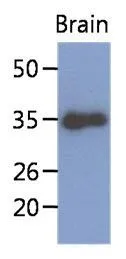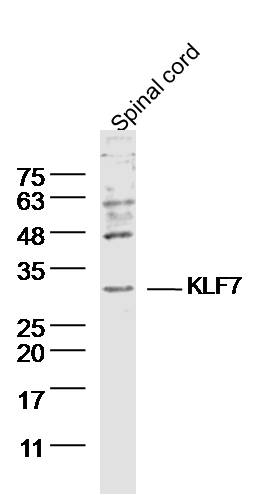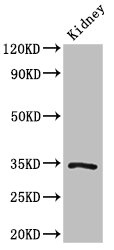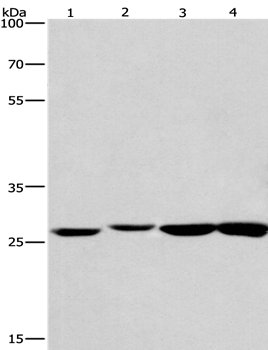
WB analysis of mouse brain lysate (40ug) using KLF7 antibody at a dilution of 1:1,000.
KLF7 antibody [AT3G3]
GTX53734
ApplicationsWestern Blot, ELISA
Product group Antibodies
ReactivityHuman, Mouse
TargetKLF7
Overview
- SupplierGeneTex
- Product NameKLF7 antibody [AT3G3]
- Delivery Days Customer9
- Application Supplier NoteThe antibody has been tested by ELISA, Western blot analysis to assure specificity and reactivity. Since application varies, however, each investigation should be titrated by the reagent to obtain optimal results. Recommended starting dilution is 1:1000.
- ApplicationsWestern Blot, ELISA
- CertificationResearch Use Only
- ClonalityMonoclonal
- Clone IDAT3G3
- Concentration1 mg/ml
- ConjugateUnconjugated
- Gene ID8609
- Target nameKLF7
- Target descriptionKLF transcription factor 7
- Target synonymsUKLF, Krueppel-like factor 7, Kruppel like factor 7, Kruppel-like factor 7 (ubiquitous), ubiquitous Kruppel-like factor, ubiquitous Kruppel-like transcription factor
- HostMouse
- IsotypeIgG1
- Protein IDO75840
- Protein NameKrueppel-like factor 7
- Scientific DescriptionThe protein encoded by this gene is a member of the Kruppel-like transcriptional regulator family. Members in this family regulate cell proliferation, differentiation and survival and contain three C2H2 zinc fingers at the C-terminus that mediate binding to GC-rich sites. This protein may contribute to the progression of type 2 diabetes by inhibiting insulin expression and secretion in pancreatic beta-cells and by deregulating adipocytokine secretion in adipocytes. A pseudogene of this gene is located on the long arm of chromosome 3. Alternative splicing results in multiple transcript variants. [provided by RefSeq, Aug 2012]
- ReactivityHuman, Mouse
- Storage Instruction-20°C or -80°C,2°C to 8°C
- UNSPSC41116161






